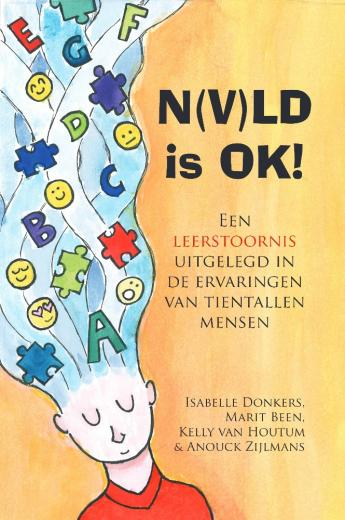

Op 19 november 2021 is ons boek N(V)LD is OK! uitgekomen. In dit boek hebben we het over wat NLD is, praten deskundigen erover en laten we mensen van over de hele wereld aan het woord die zelf NLD hebben of een kind hebben met NLD.
Links om het boek te kopen:
https://www.boekscout.nl/shop2/boek/9789464500790
https://www.bol.com/nl/nl/p/nld-is-ok/9300000068749597/
Inkijkje in het boek
"Je bent heel goed in taal, je bent verbaal vaardig, je hebt een goed geheugen, een oog voor detail waar mensen u tegen zeggen en je bent een echte doorzetter. Maar wat mensen aan de buitenkant niet kunnen zien, is dat er in jouw hersenen zich een heel ander proces afspeelt dan bij de meeste mensen. Over het algemeen werken de linkerhersenhelft en de rechterhersenhelft goed samen, maar in jouw hoofd is dat anders. Links werkt namelijk een stuk beter dan rechts. De meeste dingen kun je meedoen met de meeste anderen, maar soms kost het je veel meer tijd om die dingen aan te leren.
Byron Rourke, een psycholoog die gespecialiseerd is in neuropsychologie ontdekte in de jaren 70 van de vorige eeuw hoe het komt dat jij meer moeite hebt met nieuwe vaardigheden aanleren, je lastiger gezichtsuitdrukkingen kan lezen, je onhandiger bent dan andere mensen en moeite hebt met onder andere rekenen. Hij noemde dit NLD (Rourke, z.j.). Non Verbal Learning Disorder of Non Verbal Learning Disabilities. In het Engels ook wel NVLD genoemd (Frye en Karanzalis, z.j.).
Nu in de 21e eeuw is er nog veel onduidelijkheid over NLD. Hoewel de diagnose al zo’n 50 jaar oud is, is het toch nog een ‘jonge’ diagnose. Hierdoor weten we er nog steeds niet veel over. Ook staat NLD niet in de DSM-5; het diagnostisch en statistisch handboek met daarin alle psychische stoornissen (Balans Digitaal, z.j.).
Maar toch zijn er een heleboel mensen met NLD. Deze mensen zoeken naar erkenning en begrip. Doordat zoveel mensen de diagnose niet kennen, is het voor hen heel moeilijk om mensen met NLD te helpen en te ondersteunen."
On July 1st 2022 our book N(V)LD is OK! is released in English!
In this book we talk about what NVLD is, experts talk about it and we let people from all over the world speak who have NVLD themselves or who have a child with NVLD.
If you want to get an e-mail with the direct link to order the book, message us!
Links to order the book: https://www.boekscout.nl/shop2/boek/9789464506983
https://www.bol.com/nl/nl/p/nld-is-ok/9300000112804606/
Option 1: In the right corner you can see an English flag, when you click on this, the page will become English. You then have to click on 'afrekenen.' After that you get a form, in the right corner you can again click on the English flag and fill in the form.
Option 2: You have to click on 'bestellen', then on 'afrekenen' and then you get a form where you can fill in the country you live in.
Excerpt from the book
You are very good at language, you have verbal skills, you have a good memory, an excellent eye for detail, and you are a real go-getter. But what people cannot see on the outside is that there is a process going on inside your brain than is completely different for most people. In general, the left and right cerebral hemisphere work well together. But in your head, it is different. The left half works a lot better than the right. You can participate in most things with most other people, but sometimes it takes a lot more time to learn those things.
In the 1970s, Byron Rourke, a psychologist specialized in neuropsychology, discovered why you have more difficulty learning new skills, have more difficulty reading facial expressions, are more clumsy than other people and have difficulty with, among other things, arithmetic. He called this NLD (Rourke, n.d.). Non Verbal Learning Disorder or Non Verbal Learning Disabilities. Also called NVLD in English (Frye and Karanzalis, n.d.).
Now, in the 21st century, there is still a lot of uncertainty about NVLD. Although the diagnosis is already about 50 years old, it is still a “young” diagnosis. Because of this, we still don’t know much about it. NVLD is also not included in the DSM-5; the diagnostic and statistical manual containing all mental disorders (Balans Digitaal, n.d.).
But still, there are a lot of people with NVLD. These people seek recognition and understanding. Because so many people do not know the diagnosis, it is very difficult for them to find help and support. In this book we do not only focus on young people, but on everyone from the age of 0 to 65 in this case.

